County Debates Expanded Road Commission
Washtenaw County board of commissioners working session (May 8, 2014): Washtenaw County commissioners tackled the topic of possibly expanding the road commission board, but reached no consensus at their most recent working session.
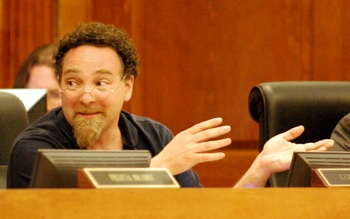
Conan Smith (D-District 9) advocated for expanding the road commission board from three members to five. (Photos by the writer.)
The road commission board is a three-member entity, and is run independently from county operations. The county board, an elected body that appoints the road commissioners, is enabled under state law to expand the road commission board to five members. The possibility of expansion has been discussed periodically for years, but was always met with resistance – most notably from some of the road commissioners themselves.
Although there have been tensions in the past, several county commissioners commented on the current positive relationship between the county and the road commission, and noted that two of the three road commissioners – Barb Fuller and Bill McFarlane – are new. The third road commissioner, Doug Fuller, has served in that role since 2008, and is the current chair. [Barb and Doug Fuller are not related.]
Commissioners who argued against expansion at this time cited the need for the relatively new road commission board to gain more experience before any changes are made.
Arguing in favor of expansion, Conan Smith (D-District 9) scoffed at the idea that the road commission was “some magical institution that needs special treatment.” The only result of leaving the road commission board at three members instead of five is that it will consolidate political power among the three current road commissioners, he said. “Those people who are there longer get to build stronger relationships, get deeper knowledge, and they have that ability then to leverage that knowledge and political authority to their own ends.” Adding two more road commissioners will bring more diversity to the governance of that organization, he argued, saying it’s something that should have been done years ago.
Smith said it’s crucial to bring more voices to bear on one of the most contentious, critical issues that the county will face in a long time – the management of the local transportation network. Over the past decade, he said, the people who’ve served as road commissioners haven’t “had the wherewithal to tackle this issue in a way that presents a comprehensive solution.” Given the changing nature of transportation, the economy and economic development, the most important thing that’s needed is a greater diversity of voices at the table, Smith concluded.
Smith, Yousef Rabhi (D-District 8) and Felicia Brabec (D-District 4) indicated that they support expansion. Dan Smith (R-District 2) and Alicia Ping (R-District 3) were inclined to keep a three-member road commission board at this time, while two other commissioners – Kent Martinez-Kratz (D-District 1) and Andy LaBarre (D-District 7) – seemed on the fence, or leaning toward picking up the issue at a later date. Commissioners Ronnie Peterson (D-District 6) and Rolland Sizemore Jr. (D-District 5) did not attend the May 8 working session.
The meeting was attended by one of the three current road commissioners, Barb Fuller. She did not formally address the board.
The issue of possible expansion comes in the broader context of discussions about whether to change the structure of the road commission – by absorbing the commission into county operations. At their Oct. 2, 2013 meeting, county commissioners created a seven-member subcommittee to “explore partnerships and organizational interactions with the Washtenaw County Road Commission.” The subcommittee made recommendations to the board earlier this year that called for leaving the road commission as an independent entity. The subcommittee did not make a recommendation about expanding the road commission from three to five members, calling it a political decision that the county commissioners should make.
The board accepted the subcommittee’s recommendations at their May 7, 2014 meeting, but have not yet made a decision about expansion.
Following the working session discussion, it’s still unclear what action, if any, will be taken regarding the possible expansion of the road commission board. Any of the county commissioners have the option of bringing forward a resolution on the issue.
Road Commission: Background
The issue of expanding the road commission board has been discussed for years, pre-dating The Chronicle’s coverage of the county board, which started in September 2008.
At that time, Democrat Jeff Irwin of Ann Arbor – who now serves as state representative for District 53 – was chair of the county board. At an Oct. 8, 2008 caucus, county commissioners discussed the pending appointment of Doug Fuller to the road commission board, and touched on issues that are still being discussed today. From Chronicle coverage:
[Jessica] Ping first pressed for details about why Irwin had met with only five of the 15 applicants. The process followed here, said Ping, is not specified in the rules and regulations. Irwin explained that those conversations were in addition to the process – that’s how you make appointments, you talk to people, it doesn’t need to be enshrined in the rules in order to undertake that kind of outreach. [Conan] Smith expressed his view that it should be enshrined.
Ping said to protect the board of commissioners, that process should be specified in the rules and regulations, possibly through an amendment. [Mark] Ouimet said that the process should be laid out explicitly (steps one, two and three, and then the chair of the board of commissioners makes a recommendation) especially now as the possibility is explored of expanding the road commission from a 3-member body to a 5-member body. Irwin said that this kind of specification of the process within the rules and regulations could be undertaken at the beginning of the year when the new board of commissioners is in place or it could be undertaken sooner if there was a consensus to do that. Irwin said that it made most sense to consider an explicit process for road commission and the parks commission, as it was these two bodies that are responsible for oversight over expenditure of significant amounts of taxpayer money.
Ping underscored her concern that the board be protected by a rigorously spelled-out process, saying, “We all get blamed for the road commission.” Ouimet weighed in for the revision to rules and regulations by the new board next year versus some of the current commissioners who may or may not be here then. [Leah] Gunn stressed that the current rules don’t preclude anyone from talking to any of the applicants and that other commissioners had been free to undertake such conversations as well. Irwin said he was trying to make the process as robust as possible and as visible as possible, stating that pursuing interviews with five applicants “doesn’t impeach the process we engaged for this.”
[Karen] Lovejoy Roe said that in her estimation, another engineer (like Fuller) is not what we need on the road commission. She said she’d heard he was the candidate of choice for the controlling faction of the board before any applications came in, but said, “That’s okay, that’s the reality. Whatever process the chair wants to use is fine.” Lovejoy Roe expressed the view that every applicant would be interviewed unless it didn’t matter what was said in those interviews.
Responding to Lovejoy Roe’s concerns about lack of diversity in professional background, Irwin offered that diversity on the road commission is of interest with respect to not just experience, but also with respect to gender, geography and ideology. Irwin continued by pointing out that the term for Fred Veigel [who at that time served on the road commission along with David Rutledge] expires at the end of 2008, and that it is no secret that there have been discussions of expanding the commission from a 3-member to a 5-member body, thus there were additional opportunities in the near term to achieve additional diversity. [Ken] Schwartz said that the board needed to nail down the process for the appointments.
The appointment process mentioned at that caucus was not implemented.
Four years ago – at the board’s April 21, 2010 meeting – Conan Smith brought forward a resolution to set a public hearing on possible expansion of the road commission board. His resolution was tabled until the May 19, 2010 meeting, when the board set a public hearing for possible expansion, after vigorous debate. The hearing was held on July 7, 2010. After another lengthy and sometimes heated discussion, the board majority voted to end the process, over dissent from Irwin and Smith.
In 2011, county commissioners debated the possibility of levying a tax for road repairs, but did not pursue that option. Discussions about the tax proposal at that time were not tied to possible expansion of the road commission board. [See Chronicle coverage from 2011: "County Road Proposal Gets More Scrutiny" and "County Board Looks to the Future."]
The following year, in 2012, Conan Smith was serving as board chair. Late in the year, he had considered holding off on a reappointment of Doug Fuller to the road commission, saying he wanted to give the new county board – who would take office in January 2013 – some flexibility in discussing the future of the road commission, including a possible consolidation with county operations. However, in an email to the board on the morning of Dec. 5, 2012, Smith stated: “Although I am hopeful that the board next year will discuss the structure of our road commission, I’m convinced by leveler heads to make our appointment decisions based on current reality rather than the potential of that change.” Fuller was subsequently reappointed by the board for a six-year term ending on Dec. 31, 2018.
The discussion Smith hoped for eventually occurred. At their Oct. 2, 2013 meeting, Washtenaw County commissioners created a seven-member subcommittee to “explore partnerships and organizational interactions with the Washtenaw County Road Commission.” Chaired by commissioner Alicia Ping (R-District 3), the subcommittee met in late 2013 and early 2014, and made recommendations to the board that called for leaving the road commission as an independent entity. The subcommittee did not make a recommendation about expanding the road commission from three to five members, calling it a political decision that the county commissioners should make.
The board accepted the subcommittee’s recommendations at their May 7, 2014 meeting, but have not yet made a decision about expansion.
For additional background on this 2013-2014 process, see Chronicle coverage: “County Board Sets Hearing on Road Tax,” “County Considers Road Funding Options,” “No Major Change Likely for Road Commission” and “Group Explores Road Commission’s Future.”
Board Discussion
Dan Smith (R-District 2) began the discussion at the May 8 working session by saying he wouldn’t want to disregard the potential for Open Meetings Act violations. However, he added, “at the end of the day, it’s a merely technical reason” for expansion. That reason alone wouldn’t be enough for him to support expanding the road commission board. He’d be more in favor of expansion if there was a way to “cast into stone” various things like making appointments based on regions of the county, or other ways of making sure there would be guaranteed broad representation. Given that there isn’t any way to do that, Smith said, he was leaning against expansion, though he was interested in what other commissioners thought.
Yousef Rabhi (D-District 8) noted that this discussion had been prompted by past dialogues at the board table. The board has made some good appointments to the road commission, he said, and based on that track record, Rabhi thought they’d be able to appoint two new road commissioners who would be great representatives of county residents.
While the county board has created a partnership with the road commission that’s better than it’s been in a long time, “it shouldn’t be about the people who are there now,” Rabhi said. “It should be about do we have a system that works for the future, to mitigate the conflict that has existed in the past.”
One issue is that in the past, the road commission appointments have been one of the most political appointments that the county board makes, Rabhi said. While he thought that the recent appointments had stayed away from that, he didn’t know if that would remain the case in the future.
[By way of example, the county board appointed Wes Prater to the road commission board after Prater lost the election for his county commissioner seat in 2006. He subsequently resigned from the road commission during his 2008 campaign for the county board – an election he won. Similarly, Ken Schwartz was appointed to the road commission board in December 2010, after he lost a November 2010 county board re-election bid in District 2 to Republican Dan Smith. Schwartz resigned from the road commission in 2013 when the Superior Township board appointed him as supervisor, after Bill McFarlane retired. The county board appointed McFarlane to the road commission board earlier this year.]
Rabhi wanted to explore how to make the appointment process more thoughtful, deliberate and planful. How do county commissioners ensure that the appointments are representative of different parts of the community – not just geographically, but also in terms of diversity, experience, background and other aspects? These considerations need to be built into the road commissioner appointment process, he said.
Rabhi noted that for many other boards and commissions that the county board appoints, the positions have designated characteristics that the appointment must satisfy. It builds that diversity of representation into the process, he said. Such an approach would help to distance the county board from the incredible pressure and politics that comes from the road commissioner appointments, Rabhi said. The process shouldn’t be about “who has the most connections,” he said.
Felicia Brabec (D-District 4) also said she’d like to see an expanded road commission board, in order to have a broader representation among road commissioners.
Alicia Ping (R-District 3), who chaired the board’s road commission subcommittee, asked about the possible timing of an expansion. She noted that there are two relatively new road commissioners – Barb Fuller and Bill McFarlane – and she thought it would be good for them to get some experience before any changes are made. The composition of the county board won’t change until the end of this year, she said, so there’s still time to wait and do something later in 2014, if that’s what the board decides. [She was referring to the fact that terms for current county commissioners run through Dec. 31, 2014. All commissioners serve two-year terms, with seats on the ballot in the August primaries and November general election this year.]
Unlike other issues related to the structure of the road commission, an expansion of the road commission board could take place whenever the county board wants, Ping noted. So at this point, she’s in favor of leaving the road commission board at three members, then addressing expansion later in the year.
Andy LaBarre (D-District 7) observed that at the last working session – on April 17, 2014 – he’d said he was in favor of expansion, for reasons of increasing diversity. Since then, he’s talked with two of the road commissioners – Doug Fuller and Barb Fuller. [They are not related.] His takeaway from those conversations is that there’s a dynamic that exists on a three-person board, “and we don’t know if the changes that we make to that dynamic are going to be, on the whole, net positives to the county and the people we serve.” LaBarre said he’s genuinely conflicted, and he’s now inclined to support delaying any expansion, though he’d like to revisit it in the future.
LaBarre said that Ping’s point was a critical one. Since October of 2013, two of the three commissioners – two-thirds of the road commission board – have been switched out, he said. The county board is asking those road commissioners to do their job while the board is having substantive discussions about the road commission and road funding. There’s also uncertainty about what the state will do regarding road funding, LaBarre said.
So LaBarre favored waiting, in part not to upset the dynamics of the current road commission and staff – a staff that’s been operating on roughly the same pay scale since 2007, he noted.
Dan Smith agreed with Rabhi about the statement that recent appointments to the road commission had been much more deliberative – and Rabhi is to be congratulated for that, Smith said. He noted that in addition to the two recent appointments, later this year the county board will be making another appointment to the road commission.
By way of background, former Superior Township supervisor Bill McFarlane was appointed at the county board’s March 19, 2014 meeting to fill the seat left vacant by the death of long-time road commissioner Fred Veigel. That term ends Dec. 31, 2014, so the county board will be making an appointment – or reappointment – later this year. Barb Fuller was appointed to the road commission on Oct. 16, 2013 to fill a seat vacated by Ken Schwartz when he took over as supervisor for Superior Township on Oct. 1. The position is for the remainder of a six-year term, through Dec. 31, 2016. And the third road commissioner, Doug Fuller, is serving a term that ends on Dec. 31, 2018.
So within a span of 15 months, three appointments will have been made. D. Smith called that “rather unprecedented.”
D. Smith also noted that unlike the issue of the county absorbing the duties and responsibilities of the road commission, there is no deadline regarding expansion. Under current law, the county board could decide to expand the road commission board from three to five members at any time. “So we can take this up at some point in the future,” he said. Smith agreed with Ping about letting the fairly new road commissioners settle in. He noted that unlike in the past, the current working relationship with the road commission is good. With expansion, he said he was “quite fearful of the pressure that might be exerted to make appointments,” especially if there’s turnover on the county board. He thought there would be more opportunities to exert that political pressure with a larger road commission board.
Conan Smith (D-District 9) weighed in, saying that the road commission “isn’t really some magical institution that needs special treatment.” It’s a political body, that serves a governmental purpose, he said, “and really nothing more than that.” The concern over whether new, diverse voices on the road commission board “is somehow going to be tragically disruptive” doesn’t bear out in any context, he said. In fact, if it were true that two-thirds of a board changing in six years were so disruptive, then that meant that he, Ronnie Peterson and Rolland Sizemore Jr. should be running the county board, Smith joked. [Those three commissioners have the longest tenure on the county board.]
“We’ve seen that kind of turnover,” C. Smith continued. “We know that it doesn’t end the world.” The reason that it’s not disruptive is that the county government and road commission have professional staff, who make sure there’s continuity and stability “despite the ramifications of the political process,” Smith said. If the road commission board were expanded, he added, “I don’t think you’re going to see some sort of crisis of politics emerge.”
C. Smith praised Rabhi’s process of vetting road commission appointments, calling it incredibly deliberate. He expected any process for future appointments under Rabhi’s leadership would be the same. “I’m sure we would get excellent people who would not be a disruptive force on the road commission in an expanded function.”
In fact, C. Smith argued, the only purpose that’s truly served by constraining the road commission to three people instead of five “is to consolidate political power amongst the three people who are already there.” A delay in expansion serves the same purpose, he said. “Those people who are there longer get to build stronger relationships, get deeper knowledge, and they have that ability then to leverage that knowledge and political authority to their own ends.”
Putting new people on the road commission board and adding diversity is a good thing, he said. It’s important to bring more voices to bear on one of the most contentious, critical issues that the county will face in a long time – the management of the local transportation network. It’s something that should be done quickly, he said – it should have been done 10 years ago. “We knew this was coming, this crisis in funding, this challenge of management. And we’ve really taken no steps toward that.”
C. Smith said he was excited about the new road commissioners, but over the past decade, the people who’ve served haven’t “had the wherewithal to tackle this issue in a way that presents a comprehensive solution,” he said. Given the changing nature of transportation, the economy and economic development, the most important thing that’s needed is a greater diversity of voices at the table, he concluded.
Kent Martinez-Kratz (D-District 1) responded, saying he’d been inclined to support expansion of the road commission board. But what makes him hesitant now is hearing commissioners talk about the need for a new, diverse board. Two-thirds of the road commission board already is new, he noted, and county commissioners have recently had the opportunity to appoint a new, diverse board. Road commissioners are geographically diverse and gender diverse, he said. So it makes him uncomfortable that some county commissioners already want another new, diverse board. Conan Smith’s comments have made him skeptical, Martinez-Kratz said. “I almost think it’s, like, politically motivated – the notion of this expansion.”
Dan Smith said he wanted to play devil’s advocate. If the county board wants to expand the road commission from three to five members, then why not from five to seven members – or even nine? A nine-member board would be possible if the county board absorbed the duties and responsibilities of the road commission – a decision that the county commissioners are not pursuing. D. Smith noted that if they did pursue that option, then the county board could conceivable appoint a road commission board that would have nine members – one representing each district of the county. He said he wasn’t suggesting this as an alternative, but it would be possible to do.
Taking it one step further, D. Smith said, he noted that the road commission works very closely with the townships. He pointed out that the road commission was initially created when the county had a board of supervisors, with representatives from each municipality. So that would be another model for a road commission board, appointing 29 members – one for each township, two from each city, and 1 for Milan. [Only part of the city of Milan is within Washtenaw County.] At first glance, that seems totally unworkable, he said, but the Oakland County board of commissioners has 21 members “and they manage to conduct business.”
D. Smith said he wasn’t advocating for a 29-member road commission board, but what’s the right number?
Conan Smith replied, saying that he appreciated D. Smith’s point. But C. Smith noted that the county board had just voted the previous night to accept a recommendation that the road commission not be absorbed into the county operations. “So all other options are off the table at this point,” he said. “You all made it very clear that the only thing you are conceivably interested in, with regards to road commission reform, is possibly expanding” from three to five members. [C. Smith had voted against accepting the recommendation.]
C. Smith said he also wanted to respond to allegations made by Martinez-Kratz about the politicization of the road commission. He noted that every current road commissioner has been appointed by a county board chair from an Ann Arbor district. “If this were a politicized process, certainly we could have done things that worked out differently in that regard.” He pointed out that he had been one of those chairs. [Jeff Irwin, a former Ann Arbor commissioner who's now the state representative for District 53, was chair when Doug Fuller was first appointed to the road commission in 2008, to fill the remainder of Wes Prater's term through 2012. C. Smith was chair when Doug Fuller was re-appointed in 2012 for a full six-year term. Another Ann Arbor commissioner, Yousef Rabhi, is the current board chair and nominated the other two sitting road commissioners – Barb Fuller and Bill McFarlane.]
“It’s not a political process,” C. Smith contended. He said it’s also not something new. “I’ve sat at this table for a decade and advocated for the exact same thing, every year.” It’s a matter of trying to get better, broader representation, he concluded, “given the systemic changes that we have to face in our transportation network.”
Rabhi also responded to Martinez-Kratz. Rabhi said he wanted to de-politicize the process, but he wasn’t sure that he’d made himself clear about that. In the past, it’s been a political process, he said, and now he’s trying to make the process more rational and deliberate. He noted that it’s true there will be another appointment made to the road commission at the end of this year, but he expects it will be a reappointment of the same person [Bill McFarlane].
However, if there are more positions on the road commission board, that would allow for more diversity, Rabhi said. He noted that diversity might mean more conservative voices. “I’m a liberal Democrat, but I think diversity of opinion is important.” Or maybe there could be more representation from the county’s north side, he said, which isn’t directly represented right now.
Rabhi said the argument that a bigger board would be more burdensome to staff “just doesn’t pan out, in my opinion.” He also argued that the Open Meetings Act issue is an important one. He reported that before that night’s working session, he and Conan Smith had met and had a conversation about “the issues of the day.” They were able to do that because it’s not a violation of the OMA for two commissioners to meet, given the size of the nine-member county board. “The road commissioners are not legally allowed to do that,” Rabhi added. Road commissioners can’t deliberate toward a decision if there’s a quorum of commissioners present, unless the meeting is posted and open to the public, he noted. With a three-member road commission board, two members constitute a quorum.
Rabhi stressed that the issue isn’t a problem with the current road commissioners. Rather, it’s about setting up a better approach for the future. For the most recent appointment, 10 people applied, Rabhi noted. People are out there who want to serve and who are qualified and can bring a lot to the table. “Just as someone can say, ‘Why do it?’” Rabhi said, “I would say ‘Why not?’” Change is difficult, he added, but necessary.
LaBarre noted that some commissioners have argued it’s not a political process, but he disagreed. “I think it is, and that’s just fine. Politics, to me, is the tool by which we do things without having to fight each other, and it’s ok.”
LaBarre said he didn’t doubt that current road commissioners and staff had the capacity to change. But he thought they needed some time to adapt to the changes that have already occurred. What’s more, expansion of the road commission board isn’t the paramount issue they need to address right now, he said.
Dan Smith agreed that it’s not the most pressing issue. He suggested that when it’s time to make an appointment later this year, it would be possible for someone to bring forward a proposal for expanding the road commission board from three to five members. That decision might be influenced by things that happen in the next six months, he said, including what the county board does regarding road funding.
LaBarre noted that by his count, it sounded like the board was split on this issue 4-4. Ronnie Peterson had previously indicated support for expansion, LaBarre said, but he didn’t know how Rolland Sizemore Jr. was leaning. [Peterson and Sizemore were absent from the working session.]
At this point it’s unclear what action, if any, will be taken regarding the possible expansion of the road commission board. Any of the commissioners have the option of bringing forward a resolution on the issue at any time.
The Chronicle could not survive without regular voluntary subscriptions to support our coverage of public bodies like the Washtenaw County board of commissioners. Click this link for details: Subscribe to The Chronicle. And if you’re already supporting us, please encourage your friends, neighbors and colleagues to help support The Chronicle, too!




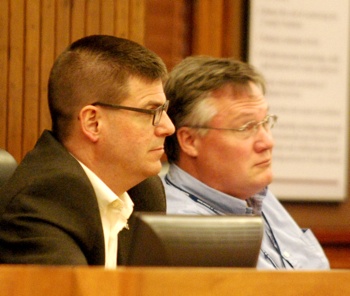
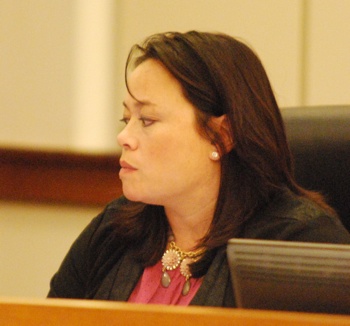
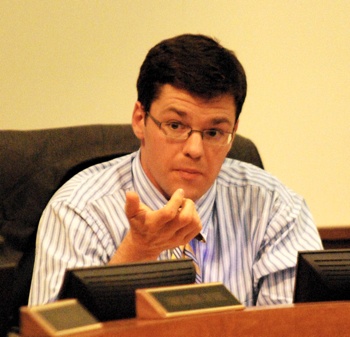

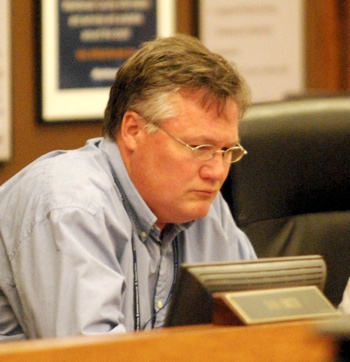
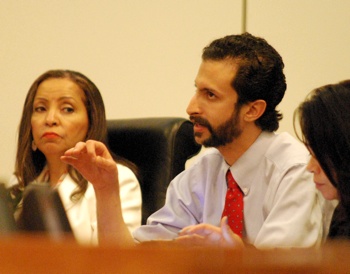
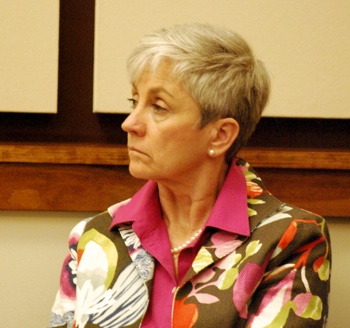
I’m impressed by the way the BOC is working through the Road Commission issue, with a full discussion of all the facets of this complex question.
The flux in the WCRC of recent years is a positive thing that has resulted in appointments of people with a good public service viewpoint and some long experience in politics. Backing off from Cmr. LaBarre’s rephrase of “Politics is war by other means”, it is nevertheless true that politics in the best sense has a real function, namely of balancing off competing interests to arrive at the best-functioning solution that can be agreed upon by all. The habit of appointing well-known political actors, which could be viewed as cronyism, is rather making sure that there is a short learning curve for this very sensitive and critically responsible body.
The WCRC has had to work with a chronically inadequate budget with which to accomplish a task that touches almost everyone’s lives on a daily basis. Since there is never enough money, regional and superlocal interests competing for attention also run up against best judgment from an engineering and administrative viewpoint (the most functionally valid solutions are not always the popular ones).
Best wishes to the BOC and congratulations to Chair Rabhi for his sensitive handling of the discussion to date.
“Those people who are there longer get to build stronger relationships, get deeper knowledge, and they have that ability then to leverage that knowledge and political authority to their own ends.”
Sounds like Conan Smith, looking in the mirror. Apparently this wasn’t an issue when the current County Commission was downsized reccently. If Smith really believes this, and isn’t looking to expand his own political power, he should not run for reelection.